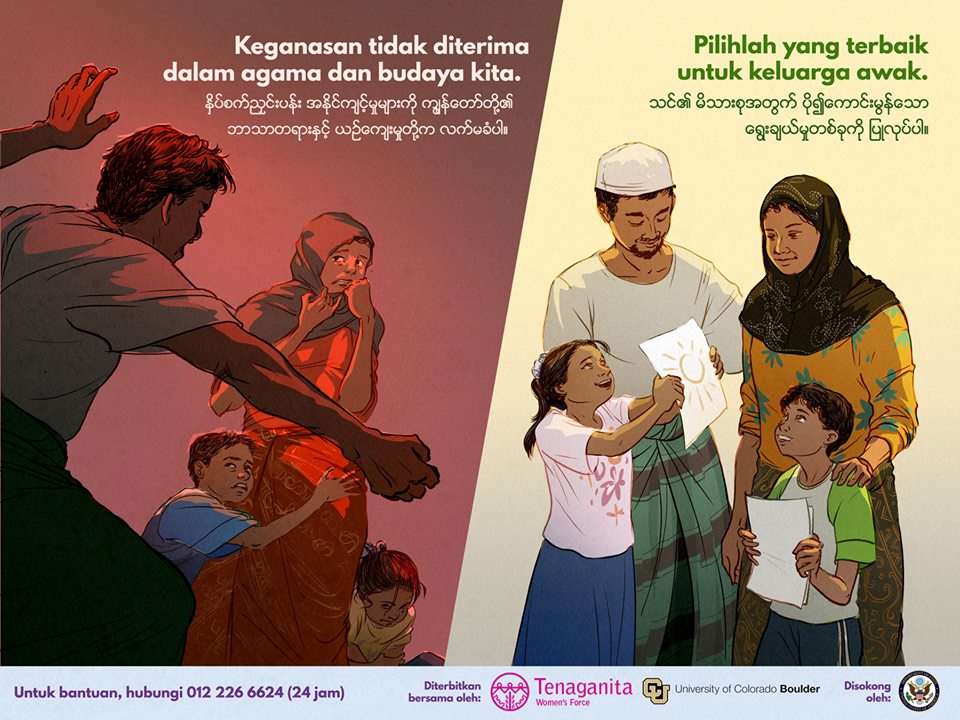
Excerpt from Tenaganita manual in Malay and Burmese on intimate partner abuse among Rohingya refugees in Malaysia
“She showed up with fresh, open wounds. She’d been beaten really badly … but we couldn’t do much. We gave her immediate medical treatment, but then we had to send her back where she came from,” my friend said to me, recalling one of the more disillusioning moments of his time spent volunteering with UNHCR’s Protection Unit. “It was a domestic issue, so UNHCR had no authority. Refugees here have dealt with UNHCR for so long that they think it’s the first port of call, but the police are meant to deal with domestic matters.”
Malaysia has not ratified the UN Refugee Convention and it has no legal framework to accommodate asylum seekers and refugees – its Immigration Act fails to legally distinguish the estimated 170,000 asylum seekers and refugees from the estimated 2-4 million undocumented migrants living in Malaysia. While a framework is in place for UNHCR to register asylum seekers for refugee resettlement in third countries, the process is slow and bureaucratic – less than 2% of those registered with UNHCR were resettled in 2017. Thus, thousands wait in Malaysia for years on end with no legal status or protection. The government claims to afford them freedom of movement, but with no law codifying this policy, they remain at constant risk of arbitrary arrest, indefinite detention, and in some instances, deportation. For refugee women suffering from domestic violence, like the one my friend encountered, this tenuous situation becomes even more difficult to navigate.
Although the Domestic Violence Act and the Penal Code apply to refugee women, they are poorly implemented and refugee women lack the legal status required to seek redress in courts. On top of this, the Domestic Violence Act, which provides for Protection Orders, does not cover non-married couples. Refugee women seeking safety from abusive spouses must report to the police to obtain a Protection Order, but the police have the authority to arrest refugees at any time – even when reporting a crime. A woman may avoid the police in particularly urgent situations by obtaining an Emergency Protection Order (EPO) from the Social Welfare Department. However, these EPOs require police intervention in the event of a breach, reinforcing this catch-22. They also remain valid for only a week, often leaving women increasingly vulnerable at the end of those seven days. The situation is summed up by human rights activist Katrina Jorene Maliamauv, who is a volunteer at Tenaganita, a Malaysian human rights organisation dedicated to advocating for and protecting migrant and refugee women and children: “The general sentiment I hear from refugee women is ‘why would we report; it entails risk and puts us in a position of vulnerability’. It’s difficult to share these stories in the first place and in the end we see no significant outcome.”
Refugee women also have few places to go. In terms of immediate medical treatment for gender-based violence (GBV), public hospitals are a non-starter due to a governmental directive requiring them to refer any undocumented person to the Immigration Department. The government’s One-Stop Crisis Centres are open to refugee women, yet require that victims fill out a police report in order to obtain any assistance – which again prevents refugee women from coming forward due to fear of arrest. Other emergency shelters exist, yet they are severely lacking in numbers and refugee women often don’t know about them. When they do, their lack of legal status may still serve as a deterrent: any GBV-related medical treatment or counselling often proves too costly to bear, as non-citizens are required to pay higher fees than Malaysian nationals for identical services. In fact, some shelters have reported victims to the immigration authorities when they were unable to pay for their GBV-related treatments.
Adding fuel to the fire, refugee women are often unable to achieve economic independence, as the Malaysian government does not afford work permits to refugees. Women have a particularly difficult time accessing jobs in Malaysia’s informal sector; they are typically limited to dishwashing or waitressing positions with no assurance of a living wage. This often leaves refugee women in a situation of reliance on their partners. Charlene Murray, the case manager for Women’s Aid Organisation – the largest service provider for domestic violence survivors in Malaysia – elaborates: “It makes it difficult for survivors of violence to walk out of their abusive situation … often when children are involved, women survivors would rather have a roof over [their] head than protection from violence.” This is further exacerbated if the male partner is also a refugee. As Murray explains, “It creates tension in the family when the [traditional] breadwinner is not able to provide for the family and sees the woman and children as a liability. It is not uncommon for men to take their frustration out over the woman, when there is financial stress caused by a long period of unemployment.” In fact, unemployment is formally recognised as a leading lethality factor in situations of domestic abuse.
The common refrain of ‘why don’t they just leave?’ rings particularly hollow in this context. As Maliamauv puts it, “If you begin with the premise that this person is illegal – and that is the language of the state – that illegality creates all of these vulnerabilities and very real barriers to seeking help, safety, shelter, justice, and healing.”
During its 2018 campaign, the new Malaysian government pledged to ratify the 1951 UN Refugee Convention and its 1967 Protocol. Its adoption in December 2018 of the UN Global Compact on Refugees may signify a political will to act, and it must be pressured to make good on its campaign promise. In the interim, advocates may find prospect in the Convention on the Elimination of all forms of Discrimination Against Women (CEDAW), ratified by Malaysia in 1995, which holds state parties accountable for the rights of all women residing in their territory, regardless of citizenship.
In its most recent Concluding Observations (COs) on Malaysia, the CEDAW Committee denoted the rights of refugee and asylum-seeking women and girls as a priority issue, emphasising the need to ensure that refugee women have a recognised legal status, as well as access to legal aid, health care, social services, and income-generating activity. Malaysia will have to report on its progress in 2020.
Malaysia can begin complying with this CO by legally codifying its policies of non-refoulement and freedom of movement for UNHCR-registered refugees, so that they are no longer subject to enforcement discretion. It can also ensure that every registered refugee is granted a UNHCR identification card, and that enforcement authorities are trained to understand and respect these cards. This way, women would be able to seek protection from the police and access healthcare without fearing arrest, detention, or deportation. To this end, it is vital that law enforcement be diversified, and trained to view security not only in terms of public order and state security, but also in terms of people-centered community safety. The general sentiment that this new administration will hammer out corruption from its law enforcement bodies lends an additional beacon of hope.
Secondly, awareness-raising must be conducted in refugee communities so that women are aware of the shelters that are available to them, and protocols must be established to enhance their access to them. The 1951 Fees Act for Foreigners should be amended to ensure that medical treatment and counselling for GBV is provided at affordable rates regardless of citizenship status, in line with CEDAW CO 10. If legal status is not granted to refugees, the government should at the very least comply with CEDAW CO 40(c) to “immediately repeal the directive requiring public hospitals to refer undocumented asylum-seekers and migrants to the immigration department” and ensure that access to its One-Stop Crisis Centres is not contingent upon the filing of a police report.
It is similarly crucial that Malaysia afford refugees the right to work, so that they may achieve some level of economic stability. Not only is this in line with CEDAW’s General Recommendation 32 and CO 7, but it is also in Malaysia’s best interest. The Immigration Department’s recent reduction in the migrant levy for foreign workers in the manufacturing, services, construction, agriculture and plantation sectors reflects the country’s recent labour shortage. Investors have expressed concerns about losses experienced in the country’s prized palm oil plantations, resulting from a decrease in Indonesian harvesters arriving to work on them. Granting refugees – who are already in the country – access to formal employment would address this labour shortage and could boost the currently lagging economy. More importantly, doing so would provide refugee women with access to income – preventing a situation of de facto reliance on abusive partners and mitigating unemployment-related anxieties in refugee men that too often translate into aggression and marital rape.
Malaysia’s hands are not tied, though unfortunately they are bloodstained. It is the responsibility of the Malaysian state to care for those currently residing in its territory, and to ensure that those already traumatised by war and persecution are not subject to yet another form of oppression within their homes.
Rachel Riegelhaupt has worked with migrant and refugee communities in Greece, Israel/Palestine, and New York City. She is an International Law and Human Rights Fellow at the NYU School of Law and served as IWRAW AP’s legal intern during summer 2019.

